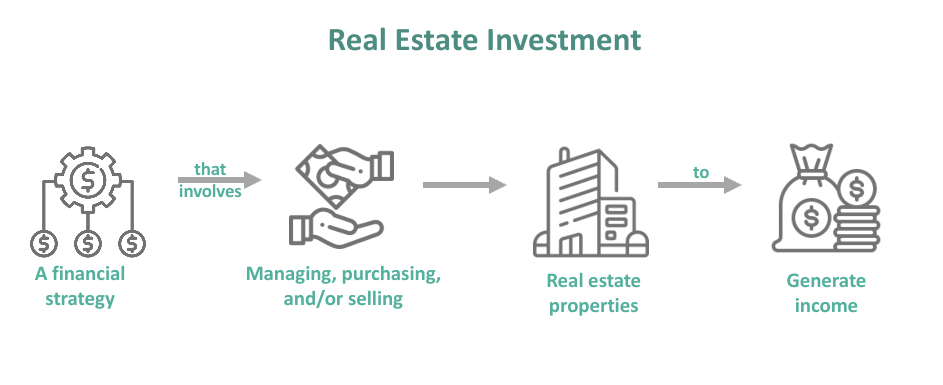Unlocking Wealth - Top Real Estate Investment Strategies
Master top real estate investment strategies! Buy smart, rent strategically, and flip for profit. Unlock financial freedom with proven tactics for every budget.
Author:Luqman JacksonReviewer:Liam EvansJan 08, 202415.8K Shares256.4K Views

Real estate investment strategiesencompass a range of techniques and approaches employed by investors to generate profits through the acquisition, ownership, management, and eventual sale of properties. These approaches can vary considerably, influenced by factors such as time commitment, risk tolerance, and the anticipated return on investment.
It is essential for investors to grasp and implement an appropriate real estate investment strategy to thrive in the property market. A clearly outlined strategy empowers investors to make informed choices, mitigate risks, and optimize returns, all while aligning their investments with their financial objectives and prevailing market conditions.
Categories Of Real Estate Investment Approaches
Extended Ownership For Rental Income
The long-term buy-and-hold approach entails acquiring property and retaining ownership over an extended period, usually leasing it out to generate a consistent stream of rental income.
This tactic relies on the property's appreciation over time, often leading to substantial capital gains upon eventual sale.
The primary merit of the buy-and-hold method lies in its capacity for prolonged wealth accumulation. With property values typically appreciating, investors can enjoy both ongoing rental earnings and increased property value.
Furthermore, this approach enables investors to leverage various tax advantages, including depreciation deductions and potential eligibility for long-term capital gains tax rates.
Renovate-and-Sell
The fix-and-flip strategy involves a brief duration of real estate investment, where an investor procures a property in need of repairs or enhancements, completes the necessary improvements, and promptly sells the property to generate a profit.
The objective is to minimize the time the property is held and maximize the return on the invested capital.
This tactic can be highly profitable for seasoned investors possessing a discerning eye for undervalued properties and strong project management capabilities.
Nevertheless, it comes with higher risks compared to other strategies, as it demands a substantial initial capital outlay, and there is always the potential for unforeseen expenses or a market downturn affecting the resale value.
Property Wholesaling
Wholesaling in real estate is an investment approach wherein an investor serves as an intermediary between a property seller and a potential buyer.
The investor secures the property at a discounted rate, then either assigns or sells the contract to another investor or end buyer at a higher price, thereby making a profit.
For investors with limited capital, wholesaling can be an appealing strategy, as it typically involves minimal or no upfront financial commitment.
However, achieving success in wholesaling requires a solid grasp of property values, effective negotiation skills, and a network of potential buyers.
It is important to note that this strategy often yields narrower profit margins compared to other methods, such as fix-and-flip or the long-term buy-and-hold approach.
Short-Term Rental/Accommodation Platforms
The Airbnb/vacation rental approach entails leasing property for brief periods to travelers, typically utilizing platforms such as Airbnbor VRBO.
This method has the potential to yield greater rental income compared to conventional long-term rentals, given the often elevated nightly rates and the possibility of year-round occupancy.
Investing in Airbnb/vacation rentals necessitates thoughtful consideration of factors like location, property type, and adherence to local regulations.
Moreover, this strategy can demand more active management, involving tasks such as handling frequent guest turnovers, ensuring cleanliness, and addressing maintenance needs.
Nevertheless, for those willing to invest time and effort in effective property management, this strategy can prove to be highly lucrative.
Investing In Commercial Properties
Engaging in commercial real estate investment involves acquiring and overseeing properties designed for business purposes, such as office buildings, retail centers, or industrial facilities.
This form of investment holds the potential for substantial income, given that commercial leases often feature extended terms and higher rental rates in comparison to residential properties.
Commercial real estate investment is generally more intricate than residential investment, requiring a deeper understanding of market dynamics, property management, and lease agreements. Additionally, it typically necessitates a higher initial capital outlay.
Despite its complexities, the allure of stable, long-term income and substantial capital appreciation renders commercial real estate an appealing choice for seasoned investors equipped with ample resources.
Considerations For Selecting A Real Estate Investment Approach
Market Dynamics
The success of a specific real estate investment strategy is significantly influenced by prevailing market conditions.
Investors need to meticulously assess existing and anticipated economic trends, local property valuations, and rental demand to discern which strategies align best with the current market scenario.
In a robust market characterized by heightened housing demand, approaches such as fix-and-flip or long-term buy-and-hold may present more lucrative opportunities.
Conversely, in a more subdued market featuring diminished property values and reduced demand, strategies like wholesaling or concentrating on rental income might be more apt.
Geographical Setting
The location stands as a pivotal element in the triumph of every real estate investment. Investors need to contemplate aspects like local employment expansion, demographic shifts, infrastructure advancements, and amenities within the neighborhood when choosing both a property and an investment approach.
Distinct locations may be more conducive to particular strategies. For instance, sought-after tourist destinations may offer higher profitability for vacation rentals, whereas regions boasting robust business activity may enhance the performance of commercial real estate investments.
Financial Capacity
The quantity of capital accessible to an investor will notably influence their selection of a real estate investment strategy.
Certain strategies, such as fix-and-flip or commercial real estate investing, demand a considerable upfront capital investment for property acquisition and enhancements.
On the flip side, approaches like wholesaling or participation in Airbnb/vacation rentals may necessitate a lower initial financial commitment.
Investors should meticulously evaluate their financial resources and opt for a strategy that corresponds with their budget and aligns with their long-term financial aspirations.
Risk Appetite
Various real estate investment strategies carry distinct levels of risk, prompting investors to assess their individual risk tolerance when selecting an investment approach.
For instance, fix-and-flip endeavors may promise substantial returns but also entail the risk of unforeseen expenses or market downturns. Conversely, long-term buy-and-hold investments are generally less precarious, though they might yield lower short-term returns.
Individual Objectives
When selecting a real estate investing strategy, an investor should consider their personal goals and investment objectives.
Some investors may emphasize generating passive income and building long-term wealth, while others may concentrate on achieving short-term capital gains or diversifying their investment portfolio.
Aligning the chosen strategy with personal goals enables investors to enhance their likelihood of success in the dynamic real estate market.
Implementing Real Estate Investment Strategies
Research And Study
Conducting comprehensive research forms the cornerstone of a prosperous real estate investment strategy. Investors should collect data on market conditions, property valuations, rental rates, and local regulations to discern potential opportunities and risks.
Online sources, collaboration with local real estate agents, and networking with fellow investors can serve as valuable reservoirs of information during this research phase.
Establishing Objectives
Defining clear and attainable goals is crucial for maintaining focus and motivation throughout the real estate investment journey.
Investors should outline both short-term and long-term objectives, encompassing targets like desired rental income, property appreciation, or the acquisition of a specific number of properties within a designated timeframe.
Assemble A Network
Engaging in real estate investment frequently involves partnering with diverse professionals, including real estate agents, attorneys, property managers, and contractors.
Forming a dependable team can assist investors in navigating the intricacies of the real estate market, ensuring a more seamless and effective investing experience.
Obtain Funding
Obtaining funding is a pivotal stage in executing a real estate investing strategy.
Investors should examine different financing alternatives, including traditional mortgages, hard money loans, or private lending, and opt for the most suitable option considering their strategy and financial circumstances.
Acquire The Property
After securing financing, investors can move forward with the property acquisition. This phase includes negotiating with the seller, performing due diligence, and completing the purchase through the closing process.
Handle Property Management
Efficient property management plays a pivotal role in optimizing returns on real estate investments. Investors should devise a strategy for property upkeep, tenant management, and addressing any arising issues.
Depending on their strategy and individual preferences, investors might opt to handle property management personally or enlist the services of a professional property management company to oversee these responsibilities.
Real Estate Investment Trusts (REITs)
Investors seeking real estate exposure in their portfolio without engaging in traditional real estate transactions may find Real Estate Investment Trusts(REITs) to be a suitable option.
A REIT is established when a corporation or trust utilizes investors' funds to acquire and manage income-generating properties. These trusts are traded on major exchanges, similar to regular stocks.
To maintain REIT status, a corporation is required to distribute 90% of its taxable profits as dividends. This unique structure allows REITs to sidestep corporate income tax, a departure from the conventional scenario where a standard company would be subject to taxation on its profits and then decide whether to distribute after-tax profits as dividends.
Similar to conventional dividend-paying stocks, REITs present a stable investment option for stock market enthusiasts seeking consistent income. Contrasted with other real estate investment forms mentioned earlier, REITs provide investors with access to nonresidential assets like malls or office buildings, which may be challenging for individual investors to directly acquire.
Significantly, the liquidity of REITs is notable as they are traded on exchanges. This means that there is no requirement for a real estate agent or a title transfer process when liquidating your investment. In essence, REITs can be viewed as a more structured iteration of a real estate investment group in practical terms.
Ultimately, when examining REITs, investors should differentiate between equity REITs, which possess ownership of buildings, and mortgage REITs, which furnish financial support for real estate and may additionally engage in investments in mortgage-backed securities (MBS). While both provide a means to access real estate, the nature of the exposure varies. Equity REITs adhere to a more conventional model by representing ownership in real estate, while mortgage REITs concentrate on generating income through financing real estate mortgages.
Advantages
- Function akin to stocks that offer dividends.
- Primary holdings typically consist of enduring, income-generating assets.
Drawbacks
- Commonly lack liquidity with specified lockup periods.
- Incurs management fees.
Investing In Property Tax Liens
Property tax lien investing involves an indirect approach to real estate investment through the acquisition of tax lien certificates. A tax lien is a legal encumbrance on a property initiated when the property owner neglects to fulfill property tax obligations, and it is imposed by the municipality where the property is situated. This lien serves as a legal entitlement to the property for the outstanding tax amount.
Unlike mortgage liens, which grant a lender rights to a property until the borrower repays the loan, tax liens are tied to unpaid property taxes. When a municipality imposes a tax lien, it issues a certificate detailing the owed amount and the interest rate the lien holder will accrue. Subsequently, these certificates are auctioned to investors, with 28 states presently permitting such auctions. The National Tax Lien Associationestimates that around $21 billion in property taxes become delinquent annually, making this sector a substantial avenue for investment.
Upon successfully winning the auction, the winning bidder settles the outstanding tax bill and gains the entitlement to either acquire the property through foreclosure or receive repayment once the homeowner settles their overdue taxes. The homeowner is given a specified duration to fulfill their payment, failing which the property becomes susceptible to foreclosure. Should the homeowner settle the dues within the allocated time frame, the lien holder recovers their initial investment along with accrued interest.
Frequently Asked Questions - Real Estate Investment Strategies
What Type Of Real Estate Investments Are Most Profitable?
Commercial real estate is known to yield higher returns than residential real estate. If you can afford to manage a commercial space, it can prove lucrative over time, depending on your area. The value of commercial real estate is determined in part by how much revenue it generates.
What Is Liquidity In Real Estate?
Liquidity is a characteristic of assets that determines how quickly they can be sold at close to market price. The less time it takes to sell, the higher the liquidity. At the same time, assets sold at a discount are not considered liquid.
How Does Leverage Work In Real Estate?
Leverage in real estate is using debt to increase the potential return on investment. The most straightforward example for real estate is a mortgage, where you're using your own money to leverage the purchase. In most cases, a 20% down payment (and a good credit history) gets you the property and house you want.
Conclusion
Navigating the real estate market requires a real estate investment strategies. While the allure of quick profits exists, remember: wealth often lies in the long game. By implementing the diverse real estate investment strategies explored here, you can build a resilient portfolio that generates consistent income and appreciates steadily over time. So, whether you're a seasoned investor or a curious newcomer, choose your real estate investment strategies wisely, adapt to market shifts, and watch your brick-and-mortar empire rise. The road to real estate riches may be paved with patience and research, but the rewards can be truly monumental.
Jump to

Luqman Jackson
Author

Liam Evans
Reviewer
Latest Articles
Popular Articles

